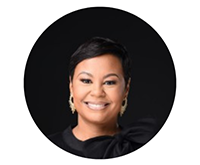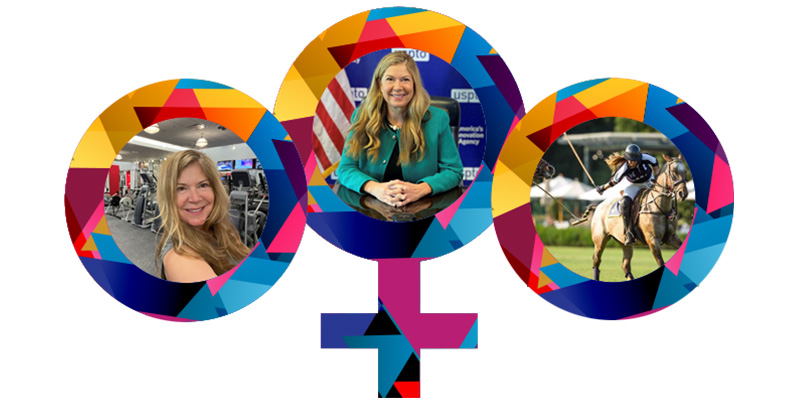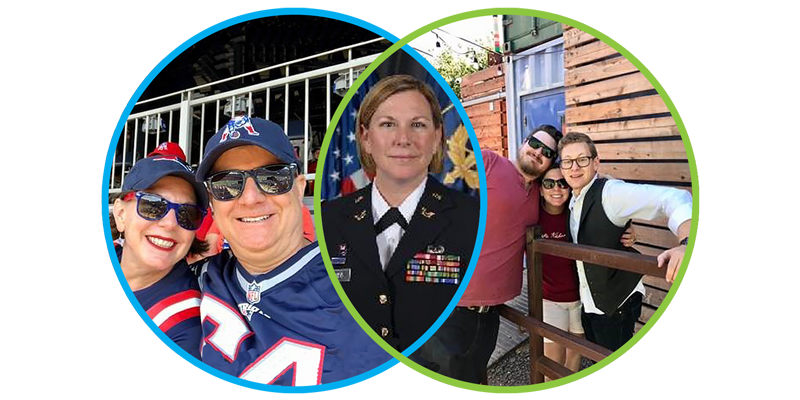Throughout history and worldwide, countless women have championed diversity, equity, inclusion, and accessibility (DEIA), making significant contributions to creating a more just and equitable society.
In closing out the 2024 celebration of National Women’s History Month, which honors women who advocate for diversity, equity and inclusion, meet the following individuals of Federally Employed Women (FEW) who promote DEIA every day. They are:
- Lauren Golubski, M.Ed., FEW Vice President for Diversity and Special Assistant to the President for People with Disabilities
- Lisa Keakalaulono Zimmerman, FEW Western Region Manager
Each discusses why DEIA is critical for women in the Federal government and the overall workplace and how the Federal government is boosting its DEIA efforts.
Q: Why is DEIA critical for women in the Federal government and the workplace in general?
A: Golubski – It’s critical to have a safe place, including DEIA initiatives for women in the workforce, both within the Federal sectors and in general, to grow personally and professionally.
Here are leading DEIA initiatives advantages:
- Ensure equal representatives. As women are capable of ALL things, breaking down barriers and biases enhances organizations and creates a level playing field where women can actively participate, contribute and advance in their careers. Increased representation of women improves diversity and brings broader experiences, ideas and insights to organizations and the implemented decision processes.
- Challenge and overcome gender bias and stereotypes. By fostering an inclusive culture that values diverse perspectives and talents, organizations can create an environment where women’s skills and potential are recognized and utilized. Overcoming gender bias promotes fairness and a more inclusive and respectful workplace.
- Support and retain women in their careers. According to a recent “Women in the Workplace” report, nine in 10 women ages 30 and under want to be promoted to the next level, and three in four aspire to become senior leaders. Supporting women in their careers is essential in helping the leaders of tomorrow and the general future, resulting in an equitable and inclusive workforce.
A: Keakalaulono Zimmerman – DEIA is critical for women because it’s often women who are excluded from opportunities to work in certain fields, experience discrimination while on the job, and face barriers in hiring, recruitment and retention. This adversely impacts performance awards, recognition and promotions.
What affects your pay now affects how comfortable you’ll be in your future retirement. For example, average lifetime earnings for women are substantially lower due to a number of factors. These include gender inequality, constraints, and biases that limit promotion opportunities, training, career advancement, career interruption for family caregiving, or unequal pay for equal work.
The Executive Order on DEIA states that the Federal government, as the nation’s largest employer, must be a model for diversity, equity, inclusion and accessibility, where all employees are treated with dignity and respect. Also, recruit, hire, develop, promote and retain its nation’s talent, removing barriers to equal opportunity. The Federal government should reflect America’s diversity. Workplaces that demonstrate a diverse, equitable, inclusive and accessible workplace yield higher-performing organizations.
DEIA is critical for women in the Federal government, and women are critical for the Federal government to succeed at its best, with a diversity of ideas, people and talent.
Q: How is the Federal government improving DEIA efforts?
A: Golubski – Based on my experiences under the Biden Administration, there have been many efforts to improve DEIA efforts. Some include promoting more women to senior positions and more women leading the way in the workforce.
A: Keakalaulono Zimmerman – Early in my career with the Federal government, I knew of military women who, along with their spouses, planned to have both a family and a career. However, once she became pregnant, she was required to be involuntarily separated from military duty.
This kept women from meeting the required years of active service to reach their full retirement and retired pay. Consequently, they couldn’t reap the lifelong financial benefits afforded male service members. The Seabee Battalions weren’t yet integrated with women, which restricted them from gaining the technical experience in the field that they needed to achieve a higher degree of proficiency. This also hampered them from being promoted to leadership positions.
The Department of Defense also had the Risk Rule, which barred women from the risk of hostile fire, capture or direct combat, effectively keeping women from working in certain fields in the military.
As civilian women, they were often the “only” or the “few.” The term “only” refers to one woman working in a traditionally masculine function (e.g., firefighter, police officer, tradesperson, etc.), which commands a higher salary. The non-supervisory information technology and engineering fields usually went up to GS-12, but there were “few” women in these fields.
Most jobs for civilian women were in the secretarial and clerical fields. These jobs were usually GS-1, 2 and 3. The highest secretarial position on our base was GS-8 for the Captain’s secretary. The highest-graded woman in the blue-collar on our base was WG-10. Most were WG-5 and below.
When one of my colleagues applied for a coveted job, she was in her third trimester of pregnancy. She asked during her interview if that would hurt her chances of being selected, as she would be taking maternity leave. There wasn’t maternity leave at the time, so you had to take your sick leave. If you were still early in your career, you most likely hadn’t accrued enough sick leave. If you borrowed sick leave, it would take two years to pay it back. So, if your family members got ill, you had to take annual leave.
Instances of sexual harassment were unfortunately common, and many buildings at base lacked ramps and elevators for accessibility. Often, recruitment efforts seeking people with disabilities were insufficient.
Based on my experiences since then, the Federal government has improved its DEIA efforts. Anyone can go online and see the various pay scales. All employees are required to get annual sexual harassment prevention training. Pregnant women can work in the military and civilian workforce and continue their careers with new leave options and accommodations for breastfeeding mothers.
The U.S. Equal Employment Opportunity Commission (EEOC) is in place, so agencies can use the Management Directive MD-715 to help them identify barriers to equal opportunity. Federal government employees can also track and report to improve their recruiting, hiring and promoting in line with a model equal opportunity employment program.
If agencies don’t comply with EEOC guidance and mandates, individuals may file a complaint to seek resolution. Adaptive and assistive tools and technologies are available to accommodate employees with disabilities.
While improvements have been made, issues remain. Women still face discrimination and are underrepresented in higher pay grades and tiers of the Federal government, as per recent reports. There are additional obstacles due to intersecting barriers experienced by women from more than one underserved community. One example is being a woman and a woman of color.
So, is there more to be done? Yes, there is.
Q: What are your passion projects and accomplishments of which you’re particularly proud?
A: Golubski – I’m proud to serve as the Vice President of Diversity and Special Assistant to the President for People with Disabilities. It’s a passion project to provide support and a more inclusive, equitable workforce for women currently in their roles and to make way for and build a pathway forward for the women behind us.
A: Keakalaulono Zimmerman – I’m honored to have worked with management in the Federal government to develop on-the-job training, which ultimately allowed employees at a lower level grade to be able to later qualify for ladder positions and be promoted from a GS-7 to GS-12. Likewise, on a similar program in blue collar for on-the-job training.
I established the Joyce W. Stewart Memorial Award, an equal employment opportunity (EEO) award at my base. The command used it for more than 25 years to acknowledge the accomplishments of military, civilians, contractors, individuals, supervisors, managers and teams in applying the principles of equal and fair treatment. This created a model EEO program, thereby removing barriers and providing avenues for career advancement and mentorship.
Additionally, I established the JUDE Scholarship, which supplies mentoring and scholarship money for a local high school. This has benefited many young women who were the first in their families to attend a university.
I’m the proud recipient of the Allie Latimer Award, presented at the 2023 FEW National Training Program (NTP). The award recognizes action and leadership resulting in service to FEW, and extraordinary grassroots effort working to achieve FEW’s mission. I was especially moved because of who the award represented, the FEW Founder Dr. Allie Latimer.
This was a full circle moment for me because I remember meeting Dr. Allie Latimer at a FEW NTP years earlier. That is another great aspect of the NTP. It’s an opportunity to meet women of history, women of destiny and women of strength. So much knowledge and wisdom at one event! The 55th FEW NTP is scheduled for August 4 – 8, 2024, at the Hilton Chicago in Chicago, Illinois.
Q: What are your thoughts on the theme: Women Who Advocate for Equity, Diversity and Inclusion, and how does FEW fit into this picture?
A: Golubski – I love the theme because I believe it’s essential for women to lead the way with DEIA initiatives and learn from other like-minded women who are striving to break barriers for women inside and outside the Federal work sector.
FEW plays a vital role in advocating, as its mission is to “work to end sex and gender discrimination, to encourage diversity for the inclusion and equity in the workplace, and for the advancement and professional growth of women in the Federal service.” Not only is this part of the mission, but as the theme, FEW is actively pursuing this mission to share with others through the theme.
A: Keakalaulono Zimmerman – If we don’t advocate, who will? Working and advocating for DEIA is essential. Most people know what’s fair and right, but it doesn’t mean they’ll do either. Many women before us fought for these rights. We must continue the work so that these hard-fought rights don’t vanish.
Women will benefit from our advocacy, and the converse is true. Women will suffer in recruitment, retention, promotion, career advancement, finances, and issues that impact our work, our lives, and our families if we fail to advocate.
FEW is the good news of this story that fits into this picture. The organization offers advocacy, mentorship, and membership. Its foundational pillars are training, diversity, compliance, and legislation. FEW stays abreast of the latest legislative issues impacting women, children, and families, as well as other topics of concern to all government employees. Moreover, FEW connects with legislators to inform them of what’s important to its national membership.
For example, the FEW Southern California Gold Coast Chapter invited our congresswoman to speak with us. One of the women in the audience asked a question regarding paid parental leave for Federal government employees. The congresswoman was surprised that federal workers didn’t yet have that and had to take unpaid leave. She took it back to Washington, D.C., and that benefit is now available because of that interaction. It happened at the FEW chapter level because women advocated for other women, which benefited all Federal government employees.
On April 30 and May 1, 2024, attend the FEW Western Region Training Program, Women Who Advocate for Equity, Diversity, and Inclusion in Las Vegas, Nevada.
Q: Who is FEW?
A: FEW, a private, non-profit organization founded in 1968, is an advocacy group that works to improve the status of women employed by the Federal government. Membership is open to those who subscribe to the organization’s purposes and carry out its mission. Participation in FEW is not limited to women. Anyone concerned about discrimination based on sex and employment opportunities for women in the Federal government is welcome to join FEW. Get in touch to learn more. We’d love to hear from you.









